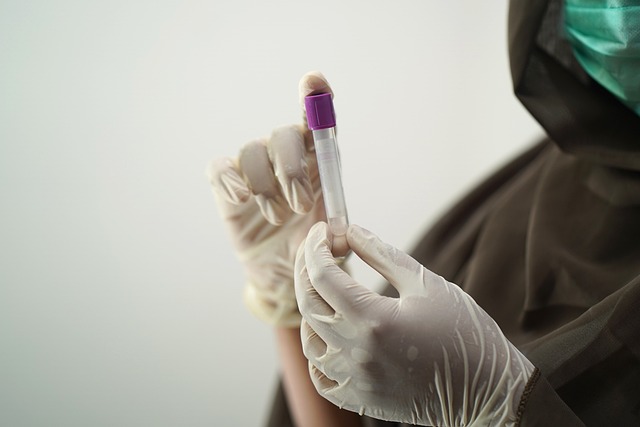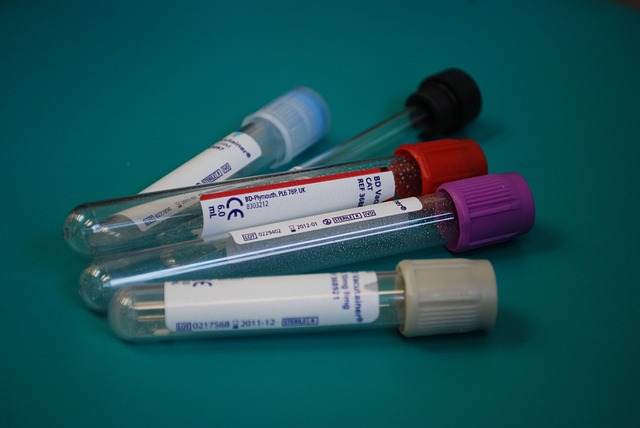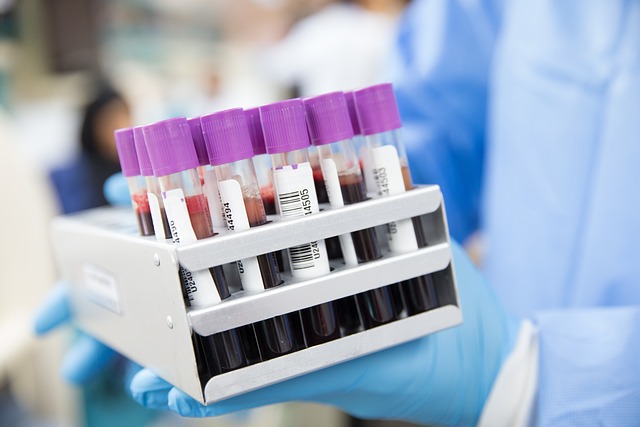The UK's healthcare system utilizes an advanced liver blood test to accurately measure Vitamin B12 levels for early detection of deficiencies. This innovative diagnostic method is crucial for identifying individuals at risk, particularly those with gastrointestinal issues, vegetarians, vegans, and older adults. It surpasses traditional tests by providing insights into subclinical deficiencies before they escalate into more severe health issues. The test is accessible through both the National Health Service (NHS) and private healthcare providers, with prompt diagnosis and treatment facilitated by a detailed medical history and symptom review. Should B12 deficiency be indicated, a personalized treatment plan, including dietary changes or supplementation, can be implemented under the guidance of a healthcare professional to prevent complications like anemia and neuropathy. Regular monitoring post-treatment ensures that Vitamin B12 levels return to normal, supporting overall health in those affected by B12 deficiency. The UK's approach to diagnosing and managing B12 deficiency through liver blood tests is efficient, patient-centric, and focused on preventing the adverse effects of this common condition.
Vitamin B12 is a critical nutrient for maintaining optimal health, playing a pivotal role in red blood cell formation and DNA synthesis. Its deficiency can lead to anemia and neurological issues, making its detection through reliable diagnostic methods essential. This article delves into the significance of Advanced Liver Blood Tests in the UK for identifying B12 deficiencies. We guide readers through the process of undergoing such tests, including clinical procedures specific to the UK. Furthermore, we elucidate how to interpret test results, providing insight into what low levels indicate about one’s health and the subsequent steps for treatment and management within the UK healthcare system. Understanding and detecting B12 deficiencies through Advanced Liver Blood Tests are key to early intervention and safeguarding well-being.
- Understanding Vitamin B12 Deficiency: The Role of Advanced Liver Blood Tests in Detection
- Navigating Blood Tests for Vitamin B12: A Step-by-Step Guide to UK Clinical Procedures
- Interpreting Your Results: What Low B12 Levels on an Advanced Liver Blood Test Reveal About Your Health and Next Steps in the UK
Understanding Vitamin B12 Deficiency: The Role of Advanced Liver Blood Tests in Detection

Vitamin B12 plays a pivotal role in maintaining optimal health, as it is instrumental in the production of red blood cells and the proper functioning of the nervous system. A deficiency in this vital nutrient can lead to anemia and neurological issues, making early detection through advanced diagnostic methods essential for timely intervention and treatment. In the UK, advanced liver blood tests have emerged as a reliable tool for detecting Vitamin B12 deficiency. These tests go beyond mere hemoglobin or blood cell counts by directly assessing B12 levels in the bloodstream. By analyzing samples from the liver, medical professionals can obtain a more precise and comprehensive understanding of an individual’s B12 status. This approach is particularly beneficial as it can identify subclinical deficiencies that might otherwise go unnoticed until symptoms become more pronounced. The integration of these advanced liver blood tests into clinical practice in the UK ensures that individuals at risk, including those with gastrointestinal disorders, vegetarians, vegans, and the elderly, can be promptly diagnosed and treated, thereby preventing the onset of complications associated with B12 deficiency.
Navigating Blood Tests for Vitamin B12: A Step-by-Step Guide to UK Clinical Procedures

Navigating blood tests for Vitamin B12 in the UK is a straightforward process, facilitated by the National Health Service (NHS) and private healthcare providers alike. When suspected of having a deficiency, it is crucial to undergo an advanced liver blood test, which includes the measurement of serum vitamin B12 levels. This test is pivotal in detecting abnormalities that may indicate a B12 deficiency. The process commences with a request from a healthcare professional, who will take into account your symptoms and medical history. Once the test is ordered, a nurse or phlebotomist will draw blood from a vein in your arm at an NHS clinic, community centre, or hospital. It is imperative to provide a comprehensive medical history and describe any symptoms related to B12 deficiency, as this can guide the healthcare provider in deciding whether additional tests, such as the methylmalonic acid (MMA) and homocysteine levels, are necessary for a more accurate diagnosis. After the blood sample is collected, it is sent to a laboratory for analysis. The results will inform whether supplementation or dietary changes are needed to rectify any deficiency. For those seeking a private healthcare option, clinics across the UK offer similar services with potentially quicker appointment availability and results turnaround times. Understanding the importance of accurate B12 levels is key to maintaining overall health and preventing the adverse effects associated with a deficiency. The UK’s clinical procedures for detecting Vitamin B12 deficiency through blood tests are well-established and accessible, ensuring patients receive the care they need.
Interpreting Your Results: What Low B12 Levels on an Advanced Liver Blood Test Reveal About Your Health and Next Steps in the UK

An advanced liver blood test in the UK is a pivotal diagnostic tool for assessing one’s vitamin B12 levels, which are integral to maintaining optimal health. If your test results indicate low B12 levels, it may reveal a deficiency that can affect various aspects of your well-being, including cognitive function, energy levels, and the production of red blood cells. It is imperative to understand what these findings mean for your individual health. Low B12 is often associated with dietary insufficiencies or absorption issues, particularly in older adults or those with certain gastrointestinal conditions such as Crohn’s disease or celiac disease.
Upon receiving low B12 results, the next steps involve a comprehensive evaluation and treatment plan tailored to your specific needs. In the UK, healthcare providers typically recommend a follow-up consultation to discuss dietary modifications, oral supplementation, or in some cases, B12 injections. These interventions aim to restore B12 levels to within the normal range, thereby preventing potential complications like anaemia or neuropathy. It is crucial to work closely with your GP or a specialist to determine the underlying cause of the deficiency and to establish a treatment regimen that addresses your unique health situation. Your healthcare team will also monitor your progress to ensure that B12 levels are rising appropriately, reflecting a successful management strategy for your health going forward.
In conclusion, vitamin B12 deficiency is a health concern that can be effectively detected through the use of advanced liver blood tests, which are widely accessible in the UK. The article has outlined the critical role these tests play in early diagnosis and the importance of understanding the clinical procedures involved in obtaining accurate results within the UK healthcare system. With this knowledge, individuals can take proactive steps towards managing their B12 levels, thereby safeguarding their overall health. For those who suspect a deficiency, it is advisable to consult with a healthcare provider to arrange for an advanced liver blood test, which serves as an essential diagnostic tool in the UK for assessing B12 status and identifying any underlying conditions that may necessitate medical intervention. Understanding the significance of these tests and the subsequent steps following a diagnosis is key to maintaining optimal health and well-being.
